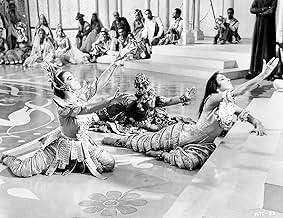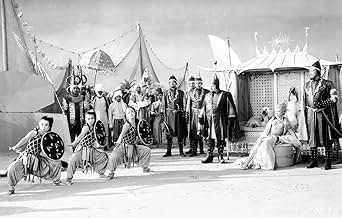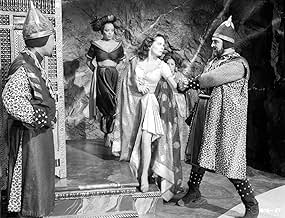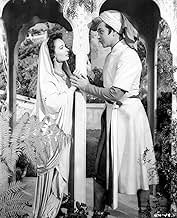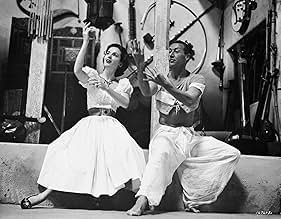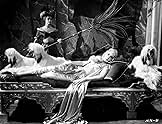IMDb RATING
6.2/10
1.7K
YOUR RATING
A roguish poet is given the run of the scheming Wazir's harem while pretending to help him usurp the young caliph.A roguish poet is given the run of the scheming Wazir's harem while pretending to help him usurp the young caliph.A roguish poet is given the run of the scheming Wazir's harem while pretending to help him usurp the young caliph.
Ray Aghayan
- Brave Shopkeeper
- (uncredited)
Ed Agresti
- Nobleman
- (uncredited)
Richard Alameda
- Nobleman
- (uncredited)
Suzanne Ames
- Harem Showgirl
- (uncredited)
Jan Arvan
- Manservant
- (uncredited)
William Bagdad
- Wholesaler
- (uncredited)
Ross Bagdasarian
- Fevvol
- (uncredited)
Rama Bai
- Plump Ayah
- (uncredited)
Storyline
Did you know
- TriviaIt was Vernon Duke who suggested Bob Wright and Chet Forrest use the music of Aleksandr Borodin as a basis for their score.
- GoofsPrior to the start of "Not Since Nineveh", Dolores Gray takes the gold purse from the Wazir to throw coins. When she's finished, she tosses it back to Sebastian Cabot which the actor fumbles and drops at his feet. During the song, the bag disappears and reappears at times and ends up behind his feet. It finally disappears by the end of the dance.
- Quotes
Chief Policeman: [the Poet has just been sentenced by the Wazir, and the Chief Policeman enters to find him and Lalume, the Wazir's wife, kissing] What kind of a sentence did he get?
- ConnectionsFeatured in MGM Parade: Episode #1.12 (1955)
- SoundtracksOverture
(uncredited)
Music and Lyrics by Bob Wright and Chet Forrest
Based on Themes by Aleksandr Borodin Performed by the MGM Studio Orchestra Conducted by André Previn
Featured review
This is musically the most glorious Broadway show of them all. in my judgment; and the most opulent of all filmed musicals in its sound, lyrics and colorful presentation. Of course, it might have been made differently, or better, or smaller or larger. But I am personally glad, as its biggest fan, and as writer, singer, songwriter, critic and moviegoer, that the film was made as honestly as it was. To begin with, the cast is vocally (unarguably) very fine; the two songs omitted, "Was I Wazir" and "He's in Love" were stage songs, without movement and needed omitting. The direction by Vincente Minnelli is very solid and generally fine, the use of color unprecedented. And this film has Howard Keel's best movie role ever, Ann Blyth lovely and seemingly young as his daughter, Sebastian Cabot as the wicked Wazir, Jay C. Flippen as his bandit father, suggestively sexy Dolores Gray as Lalume, and Vic Damone as the lovestruck very-young Caliph. The film's story-line follows the revived stage-play which was adapted to musical purposes in the early 1950s, for Broadway. The main storyline involves an ingenious but penniless poet, a maker of rhymes, who has a daughter; she wants a better life, he wants a better life for her. He finds gold, which a famous bandit claims as his own; but the gold buys him instant wealth; his arrest because he cannot account for the wealth nearly gets him killed; but he sells the idea that he is a magician to the Wazir and fortune favors his predictions. Four other strands are also interwoven in the deft and very entertaining plot. His daughter has met and fallen in love in a garden with the young Caliph without recognizing him; the wicked Wazir of the empire is pressing the young ruler to marry one of the Wazir's choices for monetary advantage; the Wazir's sexy favorite wife falls in love with the poet; and the bandit chief is seeking his long-lost son, who turns out to be the wicked Wazir. All the strands meet when to save his daughter from being forcibly married to the Wazir (to keep her from the Caliph who is still searching for her), the poet tries to drown the Wazir who has had his bandit father murdered when he's found him,and the Caliph alone can set things to rights when he discovers what his true enemy has been plotting. The poet accepts banishment--with Lalume--at an oasis, the daughter marries the Caliph, and the story ends in a splendid wedding. Robert Wright adapted the songs from the music of Aleksandr Borodin. Charles leader and Luther Davis get the credit for the literate screenplay; The sterling cinematography was done by Joseph Ruttenberg, art direction by Cedric Gibbons and E. Preston Ames, with set decoration by F. Keogh Gleason and Edwin Willis. Tony Duquette created the elaborate costumes for this Arabian Nights romp with hairstylings by Sydney Guilaroff and makeup by William Tuttle. Some of the lovely songs from this show are among the brightest lyrics and most beautiful melodies in Broadway--and Hollywood--history. The showstoppers are "Stranger in Paradise", "This is My Beloved", "The Olive Tree", "The Song of the Hand", Not Since Nineveh", Baubles, Bangles and Beads", "Night of My Nights", "Sands of Time" and "Rahadlakum". Among the performers, Dolores Gray is incomparable in the part, and Howard Keel very good in every respect. Among the others involved, Jack Elam, Ted de Corsia, Monty Wolley, and Flippen contribute good work. With a bit more money to expend, outdoor locations could have expanded the film. But most viewers who discover this film fall under the spell of its opulent and beautifully-pacing opening and find the production, as do professionally and personally, very enjoyable indeed.
- silverscreen888
- Jul 25, 2005
- Permalink
- How long is Kismet?Powered by Alexa
Details
- Release date
- Country of origin
- Language
- Also known as
- Un extraño en el paraíso
- Filming locations
- Metro-Goldwyn-Mayer Studios - 10202 W. Washington Blvd., Culver City, California, USA(studio: made in Hollywood, U.S.A. by)
- Production company
- See more company credits at IMDbPro
Box office
- Budget
- $2,692,960 (estimated)
Contribute to this page
Suggest an edit or add missing content



